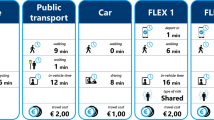Abstract
Transit agencies periodically assign each of their drivers with a shift describing when and for how long they will work each day in the following months. Since drivers are not indifferent to which shift they receive, transit agencies define different assignment methods often based on driver seniority. This article studies and compares different shift assignment policies assuming that the agency has some information regarding the approximate utility that each shift represents to each driver. Additionally, based on a study that analyzes driver utilities for flexible shifts (i.e. in which the weekly number of hours is not distributed uniformly along weekly working days), it shows that implementing flexible shifts offer a win-win opportunity for the agency and the drivers. On one hand drivers improve their productivity (i.e. fraction of the time in which drivers are actively working); on the other they increment their satisfaction with their job. This is particularly relevant since transit operational costs are strongly dependent on their labor force. Some of the benefits obtained by the firm should finally be captured by the users of the system.
Similar content being viewed by others
References
Bedi SA (1998) Sector choice, multiple job holding and wage differentials: evidence from Poland. J Dev Stud 35(1):162–179
Ceder A (2007) Public transit planning and operation: theory, modeling and practice. Elsevier, Butterworth-Heinemann, Oxford
Chávez P, Muñoz JC, Rizzi LI (2010) A study on flexible shift preferences of retail workers. Working Research paper. Department of Transport Engineering and Logistics, Pontificia Universidad Católica de Chile
Desaulniers G, Hickman MD (2007) Public transit. In: Barnhart C, Laporte G (eds) Handbook in OR and MS, vol 14, Transportation. Elsevier, Amsterdam
Hamemersh D (1977) Economic aspects of job satisfaction. In: Ashenfelter O, Oates W (eds) Essays in labor market and population analysis. Princeton University Press, Princeton
Miranda FA, Muñoz JC, Ortúzar JD (2008) Identifying driver preferences for work shift structures. Transp Sci 42(1):70–86
Montalva S (2006) Asignación de turnos de trabajo a conductores de transporte público, basadas en sus preferencias declaradas. MSc thesis, Department of Transport Engineering and Logistics, Pontificia Universidad Católica de Chile (in Spanish)
Moz M, Respício A, Pato MV (2009) Bi-objective evolutionary heuristics for bus driver rostering. Public Transp 1(3):189–210
Muñoz JC (2002) Crew-shift design for transportation systems with uncertain demand. PhD thesis, Institute of Transportation Studies, University of California, at Berkeley
Muñoz JC, Giesen R (2010) Optimization of public transportation systems. In: Encyclopedia of operations research and management science, vol 6. Springer, Berlin, pp 3886–3896
Ortúzar JD, Garrido RA (1994) A practical assessment of stated preference methods. Transportation 21:289–305
Ortúzar JD, Ivelic AM, Candia A (1997) User perception of public transport level of service. In: Stopher P, Lee-Gosselin M (eds) Understanding travel behaviour in an era of change. Elsevier, Oxford, pp 123–142
Ortúzar JD, Willumsen LG (2001) Modelling transport, 3rd edn. Wiley, Chichester
Rosen S (1974) Hedonic prices and implicit markets. J Polit Econ 82:34–55
Smith EC (1979) Compensating wage differentials and public policy: a review. Ind Labor Relat Rev 32(3):339–352
Train K (2003) Discrete choice methods with simulation. Cambridge University Press, Cambridge
Author information
Authors and Affiliations
Corresponding author
Rights and permissions
About this article
Cite this article
Montalva, S., Muñoz, J.C. & Paredes, R. Assignment of work shifts to public transit drivers based on stated preferences. Public Transp 2, 199–218 (2010). https://doi.org/10.1007/s12469-010-0031-8
Published:
Issue Date:
DOI: https://doi.org/10.1007/s12469-010-0031-8




